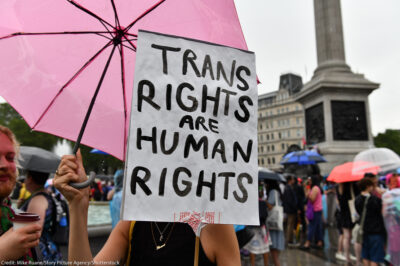In Historic First, Puerto Rico Supreme Court Considers Whether Law Denies Basic Rights to Gay People
FOR IMMEDIATE RELEASE
SAN JUAN, PUERTO RICO — For the first time in its 101-year history, the Puerto Rico Supreme Court today began considering whether gay men and lesbians are treated equally under the law. The case before the court hinges on Puerto Rico’s long-standing commitment to individual privacy and its emphasis on courts’ independence.
The American Civil Liberties Union is challenging Puerto Rico’s law banning sodomy. Under the current law, any private, consensual sexual contact between people of the same sex – as well as certain forms of intimacy between any adults – is a felony, punishable by up to $1,000 or 10 years in prison.
“Gay issues may be new to this court, but privacy issues are not,” said Janice Gutierrez-Lacourt, Executive Director of the ACLU of Puerto Rico. “However uncomfortable some people here may be with lesbians and gay men, they are even more uncomfortable with the government invading the most personal and private aspects of their lives. We believe Puerto Ricans are ready to get rid of this law, and so is our Supreme Court.”
A lower court dismissed the ACLU’s challenge to the sodomy law earlier this year. The ACLU’s appeal today marks the first time the Puerto Rico Supreme Court is being asked to address lesbian and gay rights. Just weeks ago, the Puerto Rico Supreme Court ruled in favor of a transgendered woman who sought to change the gender on her birth certificate.
Today’s appeal reminded the Puerto Rico Supreme Court that the Commonwealth’s Constitution goes much further than the U.S. Constitution in explicitly protecting citizens’ privacy. The lower court’s dismissal of the case relied on Bowers v. Hardwick, a misguided 1986 U.S. Supreme Court decision that sodomy laws are not an invasion of privacy.
That ruling, the ACLU told the court, “was decided based on the U.S. Supreme Court’s analysis of Anglo-Saxon history.” By contrast, Puerto Rico intentionally made a “societal decision” to recognize individuals’ privacy rights in its own Constitution, the ACLU’s appeal said.
“This law regulates the behavior of consenting adults in the privacy of their homes,” said Michael Adams, Associate Director of the ACLU Lesbian and Gay Rights Project. “It’s clearly a violation of Puerto Rico’s Constitution, and it also directly contradicts the extraordinary value Puerto Ricans place on personal privacy.”
In San Juan, Gutierrez-Lacourt said the sodomy law “is a clear danger to every lesbian and gay man in Puerto Rico.” Last year, a Puerto Rico appellate court made that clear in a seemingly unrelated case, she said. In a domestic violence case involving a gay male couple, the court ruled that Puerto Rico’s law on domestic violence did not apply to lesbians and gay men, since the sodomy statute “makes homosexual conduct a crime.”
In another example cited by the ACLU, the sodomy statute was used to threaten Rev. Margarita Sanchez while she was testifying about an anti-gay bill before the Puerto Rico legislature. That threat was followed by an announcement from the Puerto Rico Department of Justice that officials intended to enforce the sodomy law if police brought them evidence of violations.
The ACLU lawsuit was filed in 1998 on behalf of Rev. Sanchez and five other lesbian and gay Puerto Ricans. The ACLU also appeared as a plaintiff in the lawsuit, on behalf of its grassroots members in Puerto Rico who are lesbian, gay and straight.
In addition to Puerto Rico, 18 U.S. states have sodomy laws. The specific natures of the laws vary, as do punishments. In 1961, every U.S. state had a law banning sodomy. Today, most of them have been repealed through legislation or overturned in courts.
Puerto Rico’s sodomy law violates the Commonwealth and federal constitutions by criminalizing private, consensual, non-commercial intimacy between adults, the ACLU lawsuit contends.
The case is Sanchez, et al. v. Commonwealth of Puerto Rico. In addition to Adams, Charles Hey Maestre and Nora Vargas Acosta, both of San Juan, are attorneys in the case.
For more information on the case read ACLU’s earlier releases at: http://archive.aclu.org/news/1999/n030899c.html and http://archive.aclu.org/news/2000/n052200a.html.
A general overview of U.S. sodomy laws is available online at: http://archive.aclu.org/issues/gay/sodomy.html.
Stay Informed
Every month, you'll receive regular roundups of the most important civil rights and civil liberties developments. Remember: a well-informed citizenry is the best defense against tyranny.




